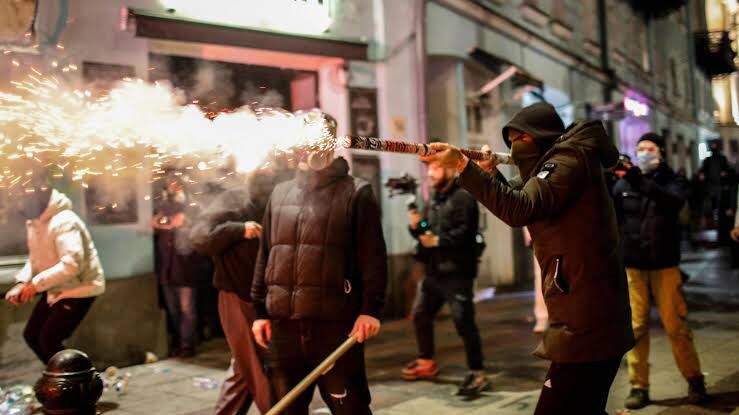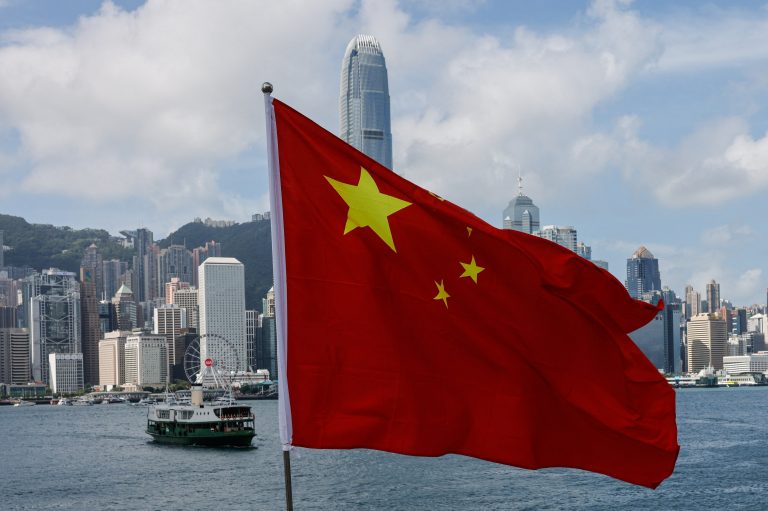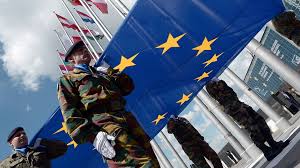
Protests Continue in Georgia After EU Bid Suspended
Pro-European demonstrations have rocked Georgia for a fourth consecutive night, as thousands rally against the government’s decision to delay accession talks with the European Union until at least 2028. Protesters demand the reversal of what they see as a betrayal of their European aspirations, a sentiment that has brought the nation’s political tensions to a boiling point.
Fireworks and Water Cannons: A Surreal Standoff
The protests centred outside the Georgian Parliament in the capital, Tbilisi, have escalated into nightly clashes between demonstrators and police. The scenes are chaotic: fireworks launched by protesters illuminate the night sky, while police respond with streams of water fired from inside the Parliament building. Despite the confrontations, the crowds have grown larger with each passing day.
“This government has stolen our European dream,” one protester lamented, echoing the sentiments of many in the streets. The frustration is palpable, fuelled by the government’s announcement last Thursday that EU accession talks would be postponed for five years. Critics accuse the ruling Georgian Dream party of undermining the nation’s European future in favour of closer ties with Russia—a claim the government denies.
The Catalyst: A Controversial Announcement
Prime Minister Irakli Garibashvili’s announcement last week sparked the unrest. In a televised address, he stated:
“Today we have decided not to put the issue of opening negotiations with the European Union on the agenda until the end of 2028. We also refuse any budgetary grants from the European Union until the end of 2028.”
The declaration was met with immediate backlash from opposition leaders and civil society groups, who view EU membership as a critical step for Georgia’s development and independence. Although Garibashvili later appeared to soften his stance, denying that the EU bid had been suspended, his initial remarks have already ignited widespread anger.
Mixed Messages from the Government
Critics argue that the Prime Minister’s subsequent clarifications have done little to dispel the confusion. In an interview with the BBC’s Steve Rosenberg, Garibashvili blamed misinformation for the public outrage:
“We have not suspended anything related to European integration. It’s just a lie propagated by opposition leaders and media outlets linked to them.”
However, Rosenberg countered with a clip of Garibashvili’s earlier statement, highlighting the inconsistency. This apparent contradiction has only deepened public distrust. President Salome Zourabichvili, a pro-European figure often at odds with the government, described the situation as a “confused and inconsistent stance” that has fuelled the protests.
Violence on Both Sides
The demonstrations have not been without violence. Protesters have accused police of excessive force, with videos circulating online showing officers using batons and water cannons against unarmed individuals. Conversely, authorities claim that some demonstrators have resorted to aggressive tactics, including the use of improvised firework-guns aimed at police.
The Ministry of Internal Affairs reported that 21 police officers have been injured since the protests began. Officials have pledged to investigate allegations of police brutality, though activists remain sceptical of the government’s commitment to accountability.
One opposition leader, Giorgi Vashadze, a prominent figure in the protests, commented:
“This government is resorting to violence to suppress dissent. They cannot silence the will of the people.”
Historical Context: Georgia’s European Dream
Georgia has long sought closer ties with the West, positioning itself as a pro-European democracy in the South Caucasus. Since signing an Association Agreement with the EU in 2014, the country has implemented numerous reforms to align with European standards. Public support for EU membership remains overwhelmingly high, with polls indicating that more than 80% of Georgians favour integration.
However, Georgia’s journey towards the EU has been fraught with challenges, including internal political divisions and external pressure from Russia. The ruling Georgian Dream party has faced accusations of backsliding on democratic reforms, a key requirement for EU accession. The recent postponement of negotiations has reinforced concerns that the government is drifting away from its pro-European commitments.
Opposition and Public Outcry
The protests have united a broad coalition of opposition parties, civil society groups, and ordinary citizens. Many accuse the government of acting in Russia’s interests by halting progress towards EU membership. During the demonstrations, chants of “traitors” and “no to Russia” have echoed through the streets of Tbilisi.
A protester in Tbilisi explained:
“We have been fighting for decades to build a European future for our children. This government wants to take that away from us.”
The opposition has rallied around President Zourabichvili, who has emerged as a symbol of resistance against the Georgian Dream party. Speaking to reporters, she called for the government to reverse its decision and reaffirm Georgia’s commitment to European integration.
International Reaction
The EU has expressed concern over the developments in Georgia. A spokesperson for the European Commission stated:
“The European Union remains committed to supporting Georgia’s European aspirations. We urge the government to engage in constructive dialogue with its citizens and respect their democratic rights.”
Meanwhile, analysts warn that the ongoing unrest could jeopardise Georgia’s chances of eventual EU membership. Political instability and questions over the government’s commitment to democratic principles may deter European leaders from pursuing deeper ties with Tbilisi.
Conclusion: A Nation at a Crossroads
As protests continue to swell, Georgia finds itself at a critical juncture. The choice between European integration and a potential pivot towards Russia has significant implications for the country’s future. For many Georgians, the fight is about more than politics; it is a battle for their identity and place in the world.
While the government insists it remains committed to EU membership, its actions tell a different story. The postponement of accession talks and domestic political tensions have created a volatile situation that shows no signs of abating. Whether the ruling party can regain the trust of its citizens and reaffirm its European path remains to be seen.
For now, the streets of Tbilisi continue to resonate with the voices of those determined to keep the European dream alive. As one protester put it:
“We will not give up. Our future is in Europe, and we will fight for it.”
Aric Jabari is a Fellow, and the Editorial Director at the Sixteenth Council.



